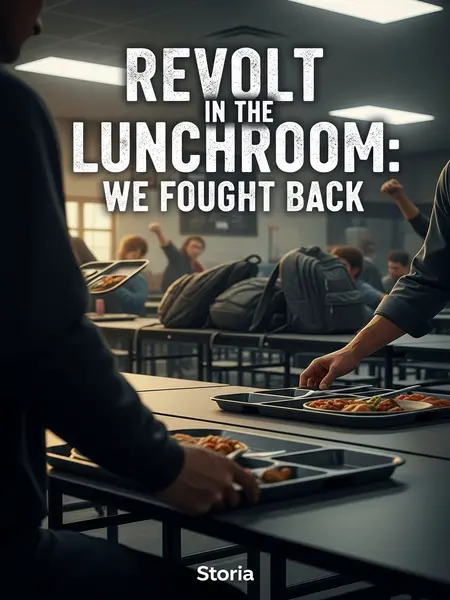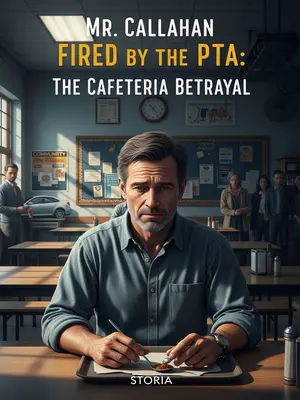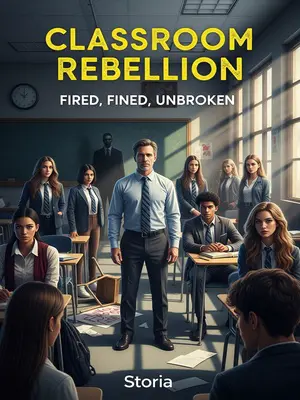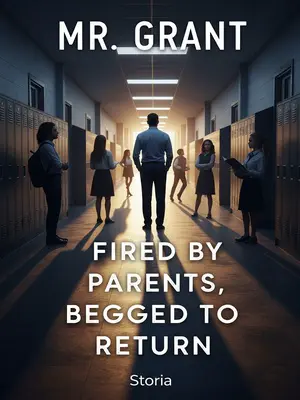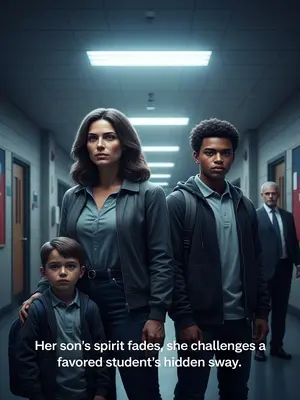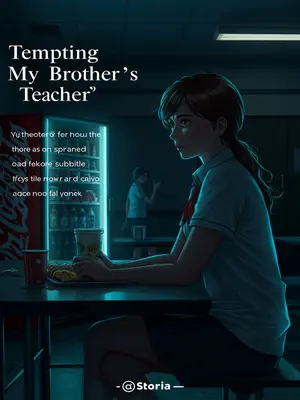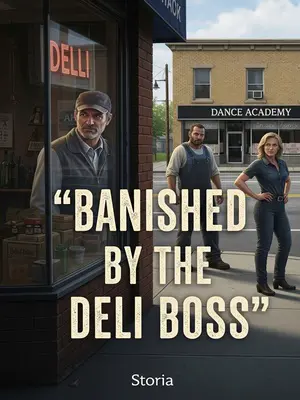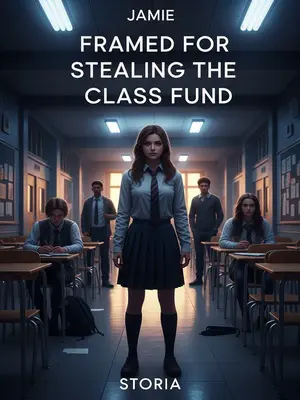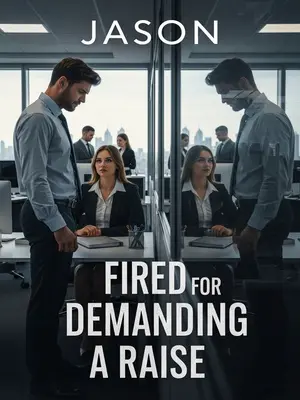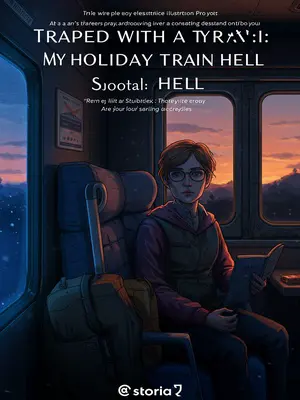Chapter 3: No Way Out
It’s not like we never complained.
We wrote letters, started petitions, even got a couple of parents to sign. The suggestion box was overflowing. We figured, maybe, just maybe, someone would listen.
But the cafeteria manager is the principal’s cousin.
That’s the real problem. Nepotism, plain and simple. In a small town, connections are everything. It’s like trying to get a fair shake from a ref whose son is playing on the other team.
Complaint letters flew into the suggestion box like snowflakes.
Every week, more notes, more signatures. Sometimes kids would stuff in entire essays or creative drawings of what the food really looks like.
Backed into a corner, the principal made two changes.
He didn’t improve the food, of course. He just made it harder for us to complain.
First, he put a lock on the suggestion box, blocking the road for honest advice.
The box is welded shut now, the little slot taped over. If you want to make a suggestion, you have to email the principal directly—good luck with that.
Then, he lectured from the podium, promoting the spirit of toughing it out.
Morning assembly turned into a lecture on “the American spirit” and “resilience.” Principal reading from a notecard, telling us hardship builds character.
He said we came to school to build character, not to enjoy ourselves.
He even quoted Teddy Roosevelt about 'the man in the arena,' like that was supposed to make our gray meat taste better. We rolled our eyes so hard we almost sprained them.
All of us are spoiled; when America was just coming out of the Great Depression, how many people got into college eating nothing but peanut butter sandwiches and canned beans?
He told us about his father’s stories from the 1930s, how kids ate plain bread and were grateful for it. Never mind that it’s 2024, and we’re paying real money for this stuff.
Only by enduring hardship can you rise above the rest.
It sounded more like an excuse for cutting corners than a real life lesson. We started calling him Principal Bootstraps behind his back.
We couldn’t afford to provoke them, so we started to avoid them.
Instead of fighting, we just tried to work around the system. You learn fast when adults won’t listen.
Those of us who lived on campus either ate outside or asked day students to bring us food.
If you had an off-campus friend, you’d pay them to bring in takeout or leftovers from home. It was an underground operation—kids sneaking Tupperware past the dorm monitors.
Then the school drove away all the food trucks at the gate, citing food safety, and started searching every day student’s backpack. If they found food, they confiscated it all.
One day, the line of taco trucks and burger vans was gone—replaced by a security guard waving a metal detector. You’d think we were smuggling in contraband, not PB&J sandwiches.
We were forced to eat ramen noodles for over half a month.
We resorted to stashing instant noodles under our mattresses, heating water in the bathroom sink, and eating like college freshmen during finals week.
Now, just smelling ramen makes us want to puke.
My stomach churns at the thought of chicken-flavored sodium bombs. If I see another Styrofoam cup, I might scream.
......
Wherever there’s oppression, there’s resistance.
That’s something I learned from history class, but it’s true for lunch, too. You can only push people so far before they push back.
One night, I was so hungry my stomach acid was bubbling up and my mouth tasted bitter.
The dorm was dead quiet, but my gut was louder than the janitor’s vacuum. I curled up in bed, counting sheep and failing miserably.
I tossed and turned in bed, unable to sleep.
Every minute dragged by. I could hear my roommate sighing in the bunk above me. Hunger keeps you wide awake, no matter how hard you try.
All I could think about was barbecue ribs, mushrooms, and fried rice.
It was torture. I started daydreaming about my mom’s home cooking—her famous ribs, buttery mushrooms, the fried rice she always made on Sundays. My mouth watered and my stomach cramped even harder.
I gnawed my pillow until it was soaked with drool.
Not proud, but I woke up with a corner of pillowcase in my teeth. The hunger was real.
Finally, I gritted my teeth—damn it, can a living person be suffocated by hunger?
I sat up, swinging my legs off the bed, determination taking over. It was do or die—literally.
I woke up my roommates and asked, do you want to starve and live, or eat your fill and die?
I whispered, "Guys, you wanna go down hungry, or risk it all for a decent meal?" Turns out, everyone else was already wide awake. Hunger makes honest men out of us all.
Turns out, none of them were asleep.
Jaden sat up first, rubbing his eyes. "Man, I was hoping someone would say something. Let’s go." We all looked at each other and nodded.
Each one had already resigned themselves to death.
The silence in the room wasn’t just hunger—it was that feeling of defeat. But now, something sparked. We were in this together.
So, we decided: three people would stay in the dorm to cover for us, and three would sneak out to buy food.
It was like planning a prison break. We drew straws—three to run lookout, three to risk it. Someone grabbed a flashlight and a hoodie, and we set a meeting spot for when we got back.
Around eleven at night, two roommates and I climbed over the wall and headed for Main Street.
My heart pounded as we slipped past the night guard, hearts racing, shoes crunching on gravel. The moon was high, and the air smelled like rain on asphalt.
There used to be loads of food trucks here, but now they were all gone.
The streetlights flickered, casting shadows over the empty curb. The sweet, greasy smell of fast food was long gone—just the faint echo of better days.
One roommate squatted on the empty street, clutching a plastic bag and sniffing hard, saying he could still smell the Philly cheesesteaks and asking if we wanted a whiff.
He closed his eyes, inhaled, and let out this dramatic sigh. "You guys smell that? The ghost of cheesesteaks past." We laughed, but it hurt.
Another roommate stared at the trash can, his eyes turning green.
No lie, he looked ready to climb in and dig for scraps. The trash can had more potential than the school lunch menu.
Even the stray cats thought they’d run into competitors.
A couple of scrappy tabbies hissed at us and darted away. For a second, we all wondered if we’d stoop that low.
We had no choice but to keep searching, hoping to find a restaurant that hadn’t closed yet.
Downtown was dark and shuttered, but we kept moving—clinging to hope that something, somewhere, stayed open late.
Halfway there, we ran into our homeroom teacher, Mr. Sanders.
He stepped out of the shadows, flashlight in hand, looking more tired than angry. My heart nearly leapt out of my chest.
He thought we’d snuck out to go to a gaming lounge.
He squinted at us, lips pressed tight. “You know the rules about the arcade, boys. I’m disappointed.”
He grabbed us and dragged us into the woods, telling us to hurry back to the dorm.
He put a gentle but firm hand on my shoulder, steering us away from the street. “I’m not letting you get yourselves expelled over Fortnite.”
Here’s some background: our school is under strict lockdown, and boarders can only go home once a month.
The campus rules are insane—only one weekend a month to see your family, the rest of the time you’re locked in, surrounded by fences and cameras.
The school is in the middle of nowhere, hardly anyone around.
The nearest real town is five miles down the road. At night, all you hear are crickets and the hum of the vending machines.
Several security teams patrol 24/7. If you’re caught sneaking out to a gaming lounge, you’re expelled on the spot.
They take discipline seriously. A rumor goes around that last year, a junior got caught and was on the next bus home before sunrise.
The school is basically a prison, and the principal is the supreme warden.
Kids call it "Alcatraz High." Even the teachers joke about it when they think no one’s listening.
I said, “Mr. Sanders, you’ve got it wrong. We’re just too hungry, we just wanted to get something to eat.”
My voice cracked a little, but I managed to get the words out. "We’re starving, Mr. Sanders. We just needed some real food."
The teacher was stunned, until my legs gave out and I sat down on the ground.
His face softened as he took in our sunken cheeks. I dropped to the grass, legs shaking. He knelt beside me, worry in his eyes.
